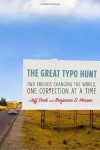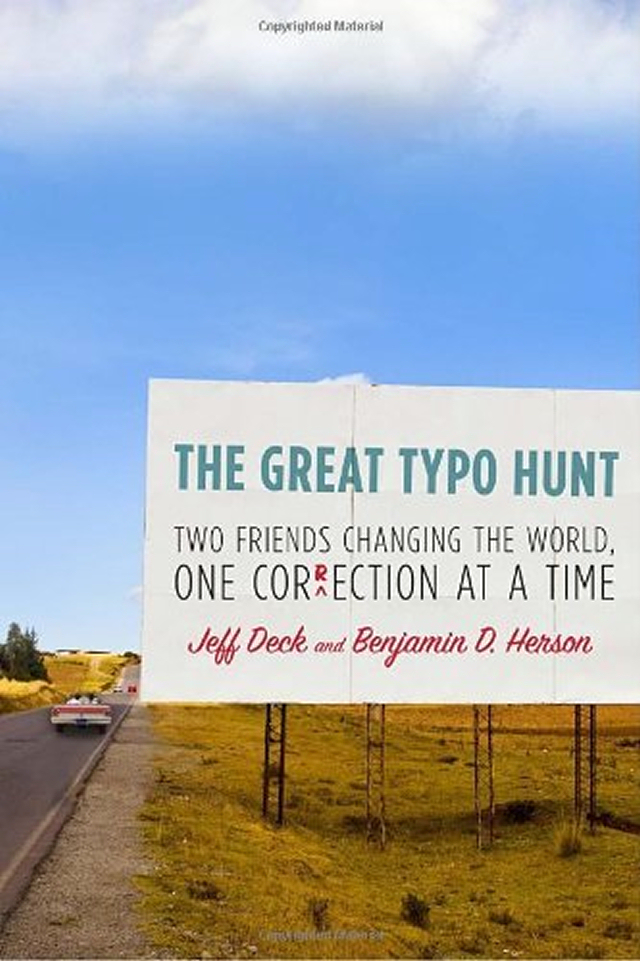
The Plot
Jeff Deck, feeling motivated by his recent college reunion to get out and do something, embarks on a months long journey across the country to correct ‘typos’: errors in punctuation, spelling and grammatical style which plague our signs, pamphlets and menus. The road trip ends up taking a turn he never saw coming.
My Thoughts
When you graduate from a college like the one I did, you know you’re expected to do great things. World-changing, exciting, inspiring things. This expectation is constantly reinforced by the glossy alumnae magazine sent to you several times a year featuring stories about the latest alumna astronaut, or author, or Secretary of State. At some point, you start to realize that most of the people being described as doing all this cool and exciting stuff are either your age or younger. That’s when the feelings of inadequacy really hit hard, and you question whether or not you’re really making the most out of your life.
So when the author arrives at his Dartmouth college reunion to find himself surrounded by budding surgeons and newly minted PhDs and millions of lawyers and non-profit do-gooders, I can completely understand his frame of mind when he looked at his own life and felt he had gone off course somewhere.
But what impressed me most was not so much that he then proceeded to come up with a plan by which he might measure up to those he considered to be doing more worthwhile things with their lives, but that he actually followed through with it. He saved his money, quit his job, and embarked on a three month long road trip around the country… correcting ‘typos’.
Now, this is an idea which, probably, had I ever had it, I would have dismissed as not grand enough. And really, deep down, I don’t think it’s very grand. But it’s interesting. It has a whimsy. It’s not without potential.
Is it an idea that can sustain a blog? Heck yeah. In fact, it seems ideally suited to blog form, where each entry can be a tale of an error corrected with pictures provided. Is it an idea that can sustain a book? Even after reading, I’m not so sure about that. In fact, quite a lot of the actual error correction was glossed over for the purposes of the narrative — during the trip upwards of 400 ‘typos’ were corrected, but we only hear details of a few dozen. Instead, there are lots of details about the road trip itself, little anecdotes (such as forgetting the tent poles) and lots of internal philosophizing on Deck’s part as he attempts to figure out why correcting these errors is worthwhile, and if it’s even morally right to try and do so.
I’m more tolerant of his metaphysical meanderings than I would be if I didn’t identify with him so strongly. The conclusions he reaches make sense to me. But I think the book would have been stronger had its direction been more clear. Is this a fun road-trip-slash-blog-project turned into a book, or is it a thoughtful opinion piece on how clarity in communication is at risk due to ignorance of spelling and grammar? It’s trying to be both and the end result is that both halves are weakened. There’s not enough anecdotal fun to support a whole book, and the opinion piece doesn’t take on the strength of a full blown essay with a proper amount of supporting evidence.
Another weak spot, for me, was the writing itself. Almost as soon as I began to read this book I had a sinking feeling. The writing was, in a word, uneven: flowing nicely along and then, abruptly, veering left into flower-ville there to get lost in its own cleverness. But I read on, because I’d committed to reading the book, and because in spite of our language incompatibility, I was enjoying the tale being told. I’d like to say the language problems improved or that it grew on me, but that would be a lie. The writing was, as I said, uneven. It never quite went over the cliff into unreadability, but it skirted the edge a few times before pulling back.
But in the end, what won me over was Deck himself (and his companions in what turned out to be literal crime). As mentioned before, I can really truly understand what motivated him to do this. And as I read, more interesting tidbits emerged to make the book even more engaging: his childhood in my own southern NH, the random shout-outs to places I’ve been (Molly’s) and local papers (Nashua Telegraph), and even down into Somerville where he was living at the time of the book (where I went to grad school). So though the book had many issues, on the whole I enjoyed reading it, and I’ll be interested to see if anything more comes of TEAL.
In Short
Though this isn’t the greatest tale ever told, the authors are relatable and the story of their days as copyeditors errant has a unique feel. For me, the book was made more interesting by the appearance of familiar places and institutions and elevated to likability not by the writing, the style of which I did not 100% approve, but by the authors themselves, with whom I felt I had a lot in common.


Huh. I didn’t have a problem with the writing.
But then, I grew up near Albany. So what do I know about writing English?
I think though we have very similar taste in writing styles, it’s not an exact match. I wasn’t a fan of some of his more literary flights.
The only thing that comes to mind is the paragraph at the start of a chapter where he’s all ‘A dark figure slunk into’ or something like that when he went to meet Herson.
And I gathered after the fact that he was just doing it to be humorous.
Oh, I quite got that it was meant to be humorous. It wasn’t.